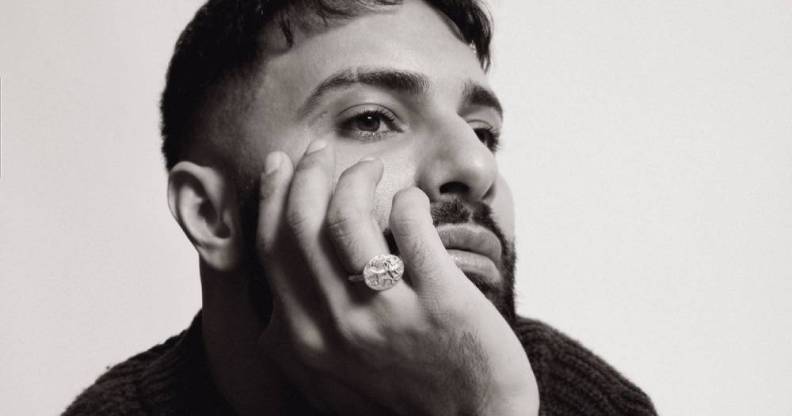Growing up gay in a Muslim household, my brothers said my coming out would ‘kill’ my parents

Singer-songwriter Zaher Saleh speaks about his struggles “growing up gay in an Arab and Muslim household”. (Provided)
Queer Palestinian songwriter and filmmaker Zaher Saleh on how he uses music and film to explore the his struggle going up gay in an Arab household, the battle between his queer identity and Islamic faith, and how love, ultimately, always conquers all.
There was a time when I couldn’t sing in public. It dates back to when I was four-years-old. I was singing for my mother and I remember how her face lit with joy and pride. When she called out to my father, I instantly saw the disapproval in his eyes. My heart sank.
From that moment I couldn’t sing in front of anyone. I sang in front of the mirror, locked in my room, hidden in the closet. It was a secret that brought me much joy, but also much doubt and shame. They say when you don’t get validation as a child, you grow hungry for it. I was ravenous.
One night there was a TV ad calling out for contestants for the fifth season of Star Academy in Lebanon. I was sitting in my living room in Ohio and it was like someone else took over. I recorded a tape and applied without anyone knowing. I got accepted and I was off to Beirut.
The minute the show was over, my life had changed forever. I suddenly had fans, working with producers and releasing original songs. I was touring and singing to thousands of people. It was too much to process but my whole family was proud of me and that made me feel validated.
But the validation I was getting wasn’t making me feel complete. In front of all those people, I was still hiding.
View this post on Instagram
One night I had dinner with Derek Anderson, a dear friend, and mentor. He suddenly asked: “Zaher, how can you hide who you are from the people closest to your heart?” I was quick to reply: “They don’t need to know. My life is my business.” But he said: “You are robbing them of the opportunity to grow and to love you for who you really are.”
That truth kept me up that night crying and thinking of all the things that could go wrong if I do share my secret. Around midnight, I texted Raida, my cousin: “I need to talk to you about something important.” It took her less than a minute to call back but it took me 40 minutes of back and forth until I finally said: “Raida, I’m gay.”
After coming out to her, I began to come out to friends in New York. As part of my journey, I made a short film that reflected my own struggles growing up gay in an Arab and Muslim household. Soon after, I came out to my three older brothers, who were against my lifestyle but said that they loved me no matter what. One thing they stressed was to never think of telling our parents because that would “kill them”. In the end, however, it was an agreement I couldn’t live up to.

Zaher Saleh says his parents still love him after he came out, but they still “fear” “being shamed for their son being gay”. (Provided)
Why? Because of love. I met an incredible man who showed me what being vulnerable really means. He stripped me of all the toxic ideas I had about myself and loved me for who I was. And that pushed me to come out to my parents.
It has been a challenging process. They love me but want me to change, in fear of being shamed for their son being gay and the possibility of me ending up in hell. I don’t want to have a victim mentality and let this define my relationship with my parents because it is much more than that. My coming out wasn’t easy for them, but they didn’t let it hinder their love for me, which is a beautiful first step.
Now, whether in music or film, I try to be as authentic as possible by speaking about the experiences and emotions I have been through. I hope people will listen and connect. And maybe one day my parents will be there cheering me on. And maybe one day my parents will be there cheering me on unconditionally.

